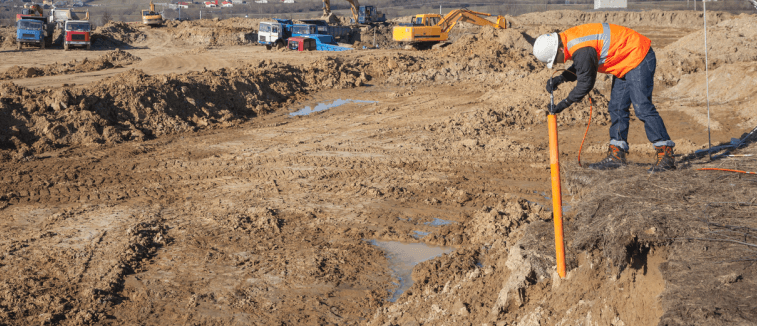Rumored Buzz on Geotheta
Rumored Buzz on Geotheta
Blog Article
What Does Geotheta Do?
Table of ContentsMore About GeothetaRumored Buzz on GeothetaRumored Buzz on GeothetaThe Main Principles Of Geotheta The Best Guide To Geotheta

They conduct site examinations, accumulate samples, execute lab examinations, and examine data to examine the viability of the ground for construction jobs - Geo Tech Engineering. Based upon their searchings for, geotechnical engineers supply referrals for foundation style, incline security, retaining frameworks, and mitigation of geotechnical dangers. They collaborate with other professionals, such as designers, architectural designers, and construction teams, to guarantee that geotechnical factors to consider are incorporated right into the total task layout and implementation
By examining the actions and homes of soil and rock, they can determine prospective geotechnical risks such as landslides, soil negotiation, or slope instability. Their expertise assists avoid failings or crashes that might jeopardize lives and residential or commercial property. Here are some comprehensive tasks and obligations of a geotechnical engineer: Website Examination: Geotechnical engineers conduct website examinations to gather data on subsurface conditions.
They translate the information to recognize the buildings and actions of the dirt and rock, including their stamina, permeability, compaction attributes, and groundwater problems. Geotechnical Analysis and Design: Geotechnical engineers examine the information accumulated throughout website investigations to assess the security and viability of the site for construction projects. They perform geotechnical calculations and modeling to assess factors such as birthing ability, negotiation, slope security, side planet pressures, and groundwater circulation.
The Of Geotheta
Structure Layout: Geotechnical designers play an important duty in designing structures that can safely sustain the intended structure. They examine the soil problems and load needs to identify the ideal structure kind, such as superficial foundations (e.g., grounds), deep structures (e.g (http://peterjackson.mee.nu/where_i_work#c2299)., heaps), or specialized strategies like dirt improvement. They take into consideration elements such as negotiation limitations, bearing capacity, and soil-structure interaction to create optimum foundation designs
They review construction strategies, screen website tasks, and perform field evaluations to verify that the style suggestions are followed. If unforeseen geotechnical issues develop, they examine the situation and give suggestions for remediation or adjustments to the layout. Threat Evaluation and Reduction: Geotechnical designers analyze geotechnical dangers and dangers connected with the task website, such as landslides, liquefaction, or dirt disintegration.

Cooperation and Communication: Geotechnical designers work carefully with other professionals associated with a task, such as architects, architectural designers, and construction groups. Effective interaction and cooperation are necessary to integrate geotechnical considerations right into the general task layout and building procedure. Geotechnical engineers supply technical competence, answer queries, and guarantee that geotechnical demands are satisfied.
More About Geotheta
Here are some kinds of geotechnical engineers: Structure Engineer: Foundation designers specialize in developing and analyzing structures for structures. They examine the soil conditions, tons requirements, and website features to determine the most proper foundation type and design, such as superficial foundations, deep foundations, or specialized methods like heap foundations.
They evaluate the aspects affecting incline security, such as soil buildings, groundwater conditions, and incline geometry, and develop techniques to stop slope failures and alleviate risks. Earthquake Engineer: Quake designers focus on assessing and developing structures to stand up to seismic forces. They evaluate the seismic risk of a website, examine soil liquefaction capacity, and develop seismic design criteria to make sure the safety and security and strength of structures throughout quakes.
They do area testing, gather examples, and evaluate the collected information to define the dirt homes, geologic developments, and groundwater conditions at a site. Geotechnical Instrumentation Designer: Geotechnical instrumentation designers concentrate on tracking and measuring the actions of dirt, rock, and frameworks. They set up and maintain instrumentation systems that keep an eye on elements such as soil settlement, groundwater degrees, slope movements, and structural variations to evaluate performance and offer very early warnings of possible problems.
Not known Factual Statements About Geotheta
They carry out examinations such as triaxial tests, debt consolidation examinations, direct shear examinations, and leaks in the structure examinations to gather information for geotechnical analysis and design. Geosynthetics Engineer: Geosynthetics engineers specialize in the style and application of geosynthetic products, such as geotextiles, geogrids, and geomembranes. They utilize these products to boost dirt security, reinforce slopes, give drain remedies, and control erosion.
They often tend to be Discover More investigative people, which implies they're intellectual, introspective, and curious. They are curious, methodical, rational, analytical, and logical. A few of them are likewise social, meaning they're kind, generous, cooperative, client, caring, handy, empathetic, tactful, and friendly. Does this seem like you? Take our free profession test to discover out if geotechnical engineer is just one of your leading job matches.
In the office atmosphere, geotechnical engineers utilize specialized software application tools to carry out calculations, develop styles, and examine information. They prepare reports, review job specs, communicate with customers and staff member, and coordinate task tasks. The workplace setting supplies a helpful atmosphere for research, analysis, and cooperation with various other professionals associated with the task.
Some Known Facts About Geotheta.
They often visit task sites to perform site examinations, evaluate geotechnical conditions, and collect information for analysis. These visits include taking a trip to different locations, often in remote or challenging surfaces. Geotechnical engineers may carry out soil tasting, conduct examinations, and monitor building and construction activities to make sure that the geotechnical facets of the job are being carried out appropriately.
Geotechnical designers likewise function in specialized geotechnical labs. Geotechnical research laboratory engineers function thoroughly in these settings, handling screening tools, running instruments, and taping information.
Report this page